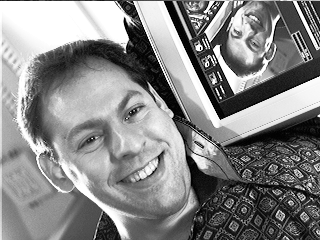 Jonathan Klein
Jonathan Klein Jonathan Klein
Jonathan KleinMr. Klein was a graduate student research assistant at the Media Laboratory from 1996 to 1998. His research (see below for a full description) focused primarily on the applications and human interface side of Affective Computing, a line of inquiry (and research group) that seeks to explore and build the nexus between computers and human emotions, founded by his advisor, Professor Rosalind Picard. Mr. Klein's Masters thesis was entitled "Computer Response to User Frustration", which described the design, creation, testing and validation of a system that was shown to significantly relieve frustration in users who had recently experienced that emotion. He earned his Masters degree in Media Arts and Sciences from MIT in June, 1999.
Before coming to the Media Lab, Mr. Klein worked with Professor Elliot Soloway, his undergraduate advisor at the University of Michigan, from 1993-1996. There, he majored in Human-Computer Interaction and Computer Graphics, a course of study he created within the Honors Program in the College of Literature, Science and the Arts. As an active member of Dr. Soloway's Highly-Interactive Computing Research Group, (a.k.a. Highly Interactive Computing in Education), Mr. Klein worked on a large number of research projects, managing software projects and designing user interfaces for collaborative learning media and other applications. Overarching research goals included bringing effective learning strategies to computational media, as well as helping tackle challenging research problems in educational technology.
Prior to returning to academia, Mr. Klein spent 12 years as a professional graphic artist and art director. His interests beyond these areas include human and animal emotions, user-centered design, interactive characters, visual, audio and robotic interaction design, educational technology, collaborative learning, social issues in technology research, machine learning, usability engineering, digital music composition, vocal effects and impressions, and computer game design.
HCI and Affective Computing: What is it like to work with a computer that is aware of its user's emotional state? Or rather, how can we design computers so that they are sensitive to the broad range of our humanity, instead of simply relating to us as if we, too, were computer-like? Mr. Klein's research focuses on interaction design issues at the applications side of Affective Computing. If and when humans routinely walk around with powerful computers on and even in their clothing, we imagine intimate computing systems that interact with their users in wholly different ways. Not only should these systems be able to adapt to their users' needs, wants and interactional preferences to a much greater extent, but they should communicate with us for the multidimentional beings that we are: not simply intellectual capacity (the tacit model of human function presented by information-processing theory), but as emotional and social beings. Systems that can relate to users on these hitherto little-supported dimensions may increase the quality of experience for users. Moveover, they represent potential means for helping to meet emotional and social needs, and enabling human users to achieve more satisfaction in dealing with machines and people alike -- making them happier and, ultimately, more productive.
Can we design computer systems that are able to adapt to, and interact with, their users in more social ways, to take into account these aspects of our humanity? Not just as a tool, but perhaps as a cooperative partner? As confidant? What would such systems look like, and can we begin to design them now, with existing technology? What is involved, and what effect will these efforts have on our relationship to technology? These questions interweave themselves throughout Mr. Klein's research at the Media Lab, several aspects of which are addressed in research projects he has been working on, below.



This Computer Responds to User Frustration: Theory, Design, and Results. (Forthcoming). Klein, J., Moon, Y., and Picard, R. W. To appear in Interacting With Computers.
Computers that Recognise and Respond to User Emotion: Theoretical and Practical Implications. (Forthcoming). Picard, R. W. and Klein, J. To appear in Interacting With Computers.
Frustrating the User On Purpose: A Step Toward Building an Affective Computer. (Forthcoming). Scheirer, J. R., Fernandez, R., Klein, J., and Picard, R. W. To appear in Interacting With Computers.
This Computer Responds to User Frustration. (1999). Klein, J., Moon, Y., and Picard, R. W. CHI'99: Human Factors in Computer Systems conference, Pittsburgh.
Computer Response to User Frustration. (1999). Klein, J. MIT Masters Thesis, February 1999.
Frustrating the User on Purpose: Using Biosignals in a Pilot Study to Detect the User's Emotional State. (1998). Riseberg, J., Klein, J., Fernandez, R., and Picard, R. W. CHI'98: Human Factors in Computer Systems conference, Los Angeles.
Support for human emotional needs in human-computer interaction. (1997). Klein, J., Riseberg, J., and Picard, R.W. Juried position paper accepted for the Workshop: HCI Research and Practice Agenda Based on Human Needs and Social Responsibility, CHI'97: Human Factors in Computer Systems conference, Atlanta.
ScienceWare's Model-It: Technology to support authentic science inquiry. (1997) Soloway, E., Pryor, A., Krajcik, J., Jackson, S., Stratford, S., Wisnudel, M., and Klein, J. T.H.E. (Technological Horizons in Education) Journal.
The design of a speech interface agent that adapts to users' conversational styles. (1997). Klein, J. Unpublished manuscript.
Learning Theory in Practice: Case Studies of Learner-Centered Design. (1996). Soloway, E., Jackson, S. L. Klein, J., Quintana, C., Reed, J., Spitulnik, J., Stratford, S. J., Studer, S., Eng, J., & Scala, N. CHI'96: Human Factors in Computer Systems, Vancouver.
Designing for Multiple User Groups: Lessons Learned from Developing Research Software for the Classroom. (1995). Jul, S., Klein, J., & Jackson. S. Unpublished manuscript.
Integrated Analysis of PlanIt-Out: A Collaborative Project Planning Tool in Support of Project-Based Science Education. (1995). Klein, J. Final Project for Human Interface to Information Technology, a course taught by Judith R. Olson. Unpublished manuscript.